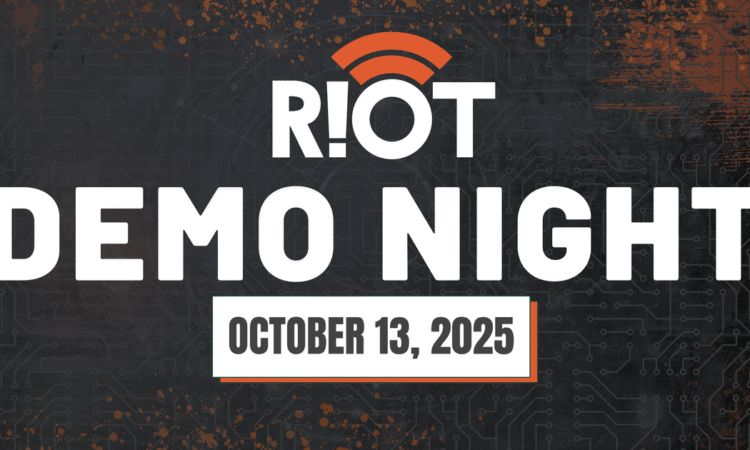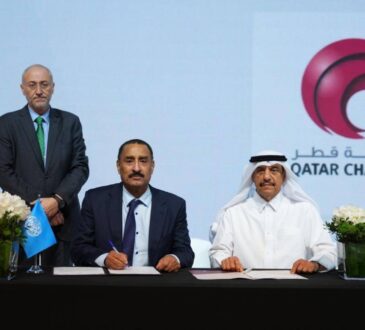
I had the pleasure of once again attending All
Things Open last week. If you haven’t been before, ATO is a massive open source
software conference, and in my opinion, the single most important conference
hosted in Raleigh each year. ATO brings together engineers, developers, product
managers and executives from around the world, who are collectively building
the future. It is by far the most collaborative and welcoming tech conference
anywhere.
For this, and other reasons, RIoT has hosted
our largest event of the year, RIoT Demo Night, in partnership with ATO for the
last 11 years. But I think of RIoT’s 2025 Demo Night as less of an event and
more of a civic phenomenon. By the time the event started, our check-in staff
was overwhelmed by the crowd surge. Over 500 people officially registered, and
many more streamed through once we flung open the doors and just let the
community in.
The sheer scale of participation was
exhilarating. Online feedback afterward has been glowing, but what’s most
exciting is how nearly every startup that exhibited has since reached out to
tell me how valuable the crowd’s engagement was. The advice, questions, and
connections they received created real value – a living example of what I
talked about last week: how showing up for innovation is itself a civic act.
The future of innovation
We opened with a keynote talk given by Kate
Pearce, the Executive Director for Dorothea Dix Park. Kate spoke about the
importance of parks and open spaces, but also how invisible technology
infrastructure is making Dix into a smart park of the future. Dix has everything from multi-spectral
wireless connectivity to underground water storage tanks that look a lot like
buried hotdog weiner mobiles.
The technology serves a number of operational
purposes to minimize cost, ease management and improve quality of experience
for guests. But it also enables the park to be multi-functional, supporting
everything from small businesses to conduct commerce to 100,000 people
descending for a concert experience like Dreamville.
Kate’s talk was also a lead-in to a full day
of discussion on Tuesday by a group that has labeled itself the Connected
Triangle+. This is a group of civic leaders, government officials, nonprofits
and corporate supporters that recognize that regions increasingly need to work
together as we tackle regional challenges that do not obey jurisdictional
boundaries. Think air quality, stormwater runoff, traffic management, climate
resilience – all of these have impacts across multiple communities.
A large park like Dix has all the elements of
a small city. It has air quality and stormwater and traffic flows and so on.
With the embedded technology infrastructure in place today, it was posited that
Dix could become the world’s first innovation testbed for parks and open
spaces, while also informing broader regional smart city solutions. I’ll write more on this topic in a future
piece, since I think the concept is intriguing. And if just a few corporate
partners come on board, it could very quickly become a reality and put Dix
favorably on the global map for innovation thought leadership.
But back to Demo Night.
Playing with purpose
A new layer of fun this year came from Bingo
Bard, one of our participating startups. They built a game that turned the
exhibit floor into a treasure hunt. Attendees downloaded a custom bingo card
filled with challenges tied to the startups in the room. Find the one doing
olfactory sensing for plants, or the company redefining cybersecurity
simplicity and you’d check the square. It was a brilliant icebreaker and a
reminder that even gamification can serve a higher purpose: connecting people
to new ideas. Event organizers everywhere should take note. Bingo Bard can
build a custom game for any setting, from conferences to weddings to family
reunions.
The Larry Bucks
experiment
Of course, no Demo Night would be complete
without our famous Larry Bucks. These
are our purely symbolic but highly spirited RIoT currency that lets attendees
“invest” in their favorite startups. Each guest received $300,000 in Larry
Bucks, and the startups placed investment boxes at their booths. By evening’s
end, millions of imaginary dollars had changed hands and those votes became
real data about what excited the community most.
This year’s Larry Bucks champion was Carolina Instruments, founded by Ellora
McTaggart. Ellora’s company is redefining how we track eye pupil movement with
stunning accuracy. Her team is unlocking potential breakthroughs in
neuroscience, concussion diagnostics, and gaming and virtual interfaces, among
other use cases. The crowd “invested” $9.3 million Larry Bucks in Carolina
Instruments, earning them this year’s top honors.
Rounding out the top five were a stellar
lineup of startups that represent the spectrum of the Data Economy:
- Tulsi (part of Kleap) – A cybersecurity platform that automates penetration testing. Just submit a URL or API endpoint, and Tulsi runs a full test, generating actionable reports that make cybersecurity accessible to teams without big budgets or technical staff.
- Verdia Diagnostics – An early-stage company using olfactory sensors to “smell” plants and detect disease days before visible symptoms appear. Their tech could transform agricultural productivity through early intervention and data-driven crop health monitoring.
- Trilliott – A software platform managing massive numbers of physical assets using low-cost RFID tags and long-range readers. Trilliott brings affordable tracking to everyday assets — from furniture across campuses to components on manufacturing lines or pill bottles in pharmacies.
- Nasoni – Innovating from an unlikely place — the bathroom. Nasoni’s smart faucets and fixtures are transforming bathrooms into centers of health for the aging-in-place population. They’re already working on features for medication adherence, fall detection, and long-term wellness tracking.
Every one of these companies is a vivid
example of what happens when community, curiosity, and civic spirit meet
technological creativity.
The power of the ecosystem
It’s also worth recognizing that none of this
happens in a vacuum. Events like Demo Night thrive because of an ecosystem —
not just of startups and supporters, but of corporate and civic partners who
help make it all possible. Huge thanks to Llama
Farm, T-Mobile for Business, and
the City of Raleigh for sponsoring
this year’s event and continuing to invest in the local innovation economy.
Civic duty in action
If last week’s column explored the idea of
civic duty in theory, Demo Night put it into practice. Every attendee who
showed up, asked a question, shared advice, or “invested” a few Larry Bucks
contributed to the data-driven future we’re building together.
Innovation doesn’t just come from code or
capital. It comes from community energy and involvement. When 500 people spend
an evening supporting ideas that might one day change the world, that’s civic
duty in its purest digital form. And judging by the spark in the room,
Raleigh’s data-driven future is burning bright.



